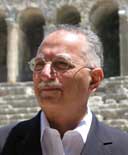Islam and/in the West |
As the world’s second largest intergovernmental organization, the Organization of the Islamic Conference (OIC) is committed to cooperating with the international community to promote and consolidate global peace, stability, harmony, security and development. As I have stressed on many occasions, the OIC is guided by the principles of moderation and modernization. The OIC’s basic documents, such as its 10 Year Program of Action and its new Charter, provide a visionary road map to meet the challenges facing Islam in the 21st century.
Diverse cultures should complement and enhance one another. Tolerance, stability and prosperity are nurtured only when communities and cultures communicate and respect each other. To speak out against Islamophobia is not to negate the existence of hatred against other religions and we Muslims must extend our hand in cooperation to counter anti-Semitism, Christianophobia and misperceptions about Western culture.
We must not be hostages to our extremists. As the entire international community is fighting radicalization and terrorism, we firmly believe that this effort must be part of an overall endeavor aimed at building a better world based on cultural diversity, in which human dignity, human rights and fundamental freedoms are properly respected.
When Barack Obama became president of the United States, he promised a new chapter in relations between the Islamic world and the West. During his first overseas visit as president, he spoke in the Turkish Parliament, saying: “The United States is not, and will never be, at war with Islam. …America’s relationship with the Muslim community, the Muslim world, cannot and will not just be based upon opposition to terrorism. We seek broader engagement based on mutual interest and mutual respect. We will listen carefully, we will bridge misunderstandings and we will seek common ground. We will be respectful, even when we do not agree. We will convey our deep appreciation for the Islamic faith, which has done so much over the centuries to shape the world -- including in my own country.”
Although there have been many obstacles on the road to good relations, this year could provide a unique opportunity to forge a new discourse of tolerance and understanding between the peoples of the Islamic world and the West. We may have to look to the Muslim communities within Western societies to provide leadership and direction for the future. More opportunities for broad and deep encounters between Muslims and non-Muslims must be developed and sustained, at both the individual and institutional levels. In light of the potential for a new climate of political openness in Muslim-majority countries, these encounters may be more possible than ever before.
Most importantly, committed organizations and individuals must unite and mobilize to isolate the extremists and remain united in working to develop the culture of tolerance and respect needed to ensure the full enjoyment of our rights. That is the only way forward for the Islamic world and the West -- and for Islam in the West.








 Professor Dr Ekmeleddin Ihsanoglu of Turkey is the Secretary-General of the
Professor Dr Ekmeleddin Ihsanoglu of Turkey is the Secretary-General of the 
Post new comment